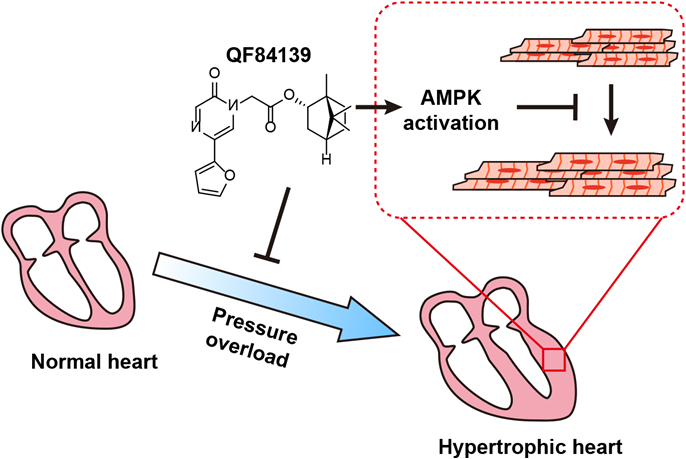Researchers Discover Novel Small Molecule for Anti-Cardiac Hypertrophy
On May 9, 2021, a research paper entitled "Small molecule QF84139 ameliorates cardiac hypertrophy via activating the AMPK signaling pathway" was published online in Acta Pharmacologica Sinica. This work was conducted by research teams led by Prof. YANG Huang-Tian from Shanghai Institute of Nutrition and Health and Prof. CHENG Yongxian from Kunming Institute of Botany, of the Chinese Academy of Sciences.
Cardiac hypertrophy is a response to the increased hemodynamic workload that arises from various physiological stimuli and pathological insults. It is characterized by an enlargement of myocardium with increases in cardiac mass and cardiomyocyte size, protein synthesis, and reactivation of fetal genes. Although it initially appears to be adaptive, the long-term cardiac hypertrophy is associated with a significantly increased risk of heart failure and ultimately leads to high rates of mortality and morbidity.
Although drug treatments can temporarily relieve the symptoms of patients with slowing the development of myocardial hypertrophy to heart failure, it cannot significantly prolong the survival of patients with moderate and severe heart failure, and these drugs are accompanied by different degrees of toxic side effects. Therefore, there is an urgent need to develop more and better pioneering compounds and anti-hypertrophy drugs.
Traditional Chinese medicine (TCM) is a precious resource, and natural products play a pivotal role for drug discovery. Although the number of natural products is limited, millions of natural product hybrids (NPHs) as combinations of parts of different natural products can be developed and severed as new leads for drug discovery.
In this study by CAS researchers, 24 natural compounds from various plants and animals, such as agaricus chinensis, cricks, glucoderma lucidum, tripterygium wilfordii and acorus calamus, and their synthetic derivatives were screened and a new small molecule QF84139 with anti-cardiac hypertrophic effect was identified.
By using a neonatal rat cardiomyocyte hypertrophy model and the pressure overload-induced myocardial hypertrophic murine model, combined with AMPK agonist/inhibitor, siRNA, and AMPK knockout mice, the researchers demonstrated for the first time that this small molecule can ameliorate the cardiac hypertrophy induced by phenylephrine and pressure overload through activating adenosine 5′- monophosphate-activated protein kinase (AMPK) signaling pathway that maintains cellular energy balance and regulates nutrient levels.
These findings emphasize the value of natural product derivatives in the development pharmacological therapy for cardiac hypertrophy and the structurally novel compound QF84139 would provide a promising lead compound for developing effective agents for the treatment of cardiac hypertrophy.
This work was supported by the National Natural Science Foundation of China, Strategic Priority Research Program of the CAS, National Key R&D Program of China, and the research funding from Shanghai Jiao Tong University Affiliated Sixth People’s Hospital. Professor ZHANG Youyi's team from the Third Affiliated Hospital of Peking University have provided great support and help to this work.

The novel structured small molecule QF84139 inhibits the pressure-overload induced cardiac hypertrophy by activating AMPK signaling. (Image provided by Prof. YANG Huang-Tian's team)
Media Contact:
WANG Jin (Ms.)
Shanghai Institute of Nutrition and Health,
Chinese Academy of Sciences
Email: sibssc@sibs.ac.cn
Web: http://english.sinh.cas.cn/
